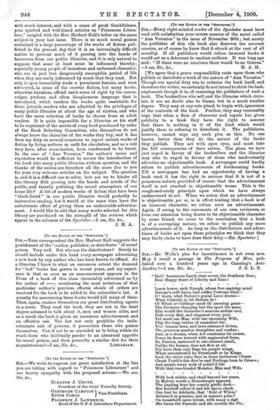[To THE EDITOR 07 TEE "SPECTATOR:]
SIR,—Every right-minded reader of the Spectator must have read with satisfaction your severe censure of the novel called " Ann Veronica" in the issue of November 20th ; but -surely the publisher of this vile book also deserves the severest censure, as of course he knew that it struck at the root of all morality. If all publishers would refuse immoral books it would act as a deterrent to unclean authors. It was long ago said : " If there were no receivers there would be no thieves."
[We agree that a grave responsibility rests upon those who publish or distribute a work of the nature of "Ann Veronica." Though our special duty was to criticise the book itself, and therefore the writer, we certainly do not intend to shirk the task, unpleasant though it is, of censuring the publishers of such a book. The booksellers who sell and the libraries which circu- late it are no doubt also to blame, but in a much smaller degree. They may at any rate plead, to begin with, ignorance of the contents of the book. Further, they may reasonably urge that when a firm of character and repute has given publicity to a book they have the right to assume that there is nothing in it of the kind which would justify them in refusing to distribute it. The publishers, however, cannot urge any such plea as this. No one knows better than they do the nature of the books they publish. They act with open eyes, and must take the full consequences of their action. The pleas we have just urged in favour of the booksellers and the libraries may also be urged in favour of those who inadvertently advertise an objectionable book. A newspaper could hardly refuse to publish advertisements of forthcoming books. Till a newspaper has bad an opportunity of having a book read it has the right to assume that it is not of a poisonous nature, provided of course that the advertisement itself is not couched in objectionable terms. This is the rough-and-ready principle upon which we have always endeavoured to act. When we notice that an advertisement is objectionable per se, is in effect hinting that a, book is of an immoral character, we refuse such an advertisement. Again, if owing to the comments of our own reviewers, or from our attention being drawn to its objectionable character by some friend, we come to the conclusion that a book is of a corrupting nature, we refuse to publish any more advertisements of it. As long as the distributors and adver- tisers of books act upon these principles we think that they may fairly claim to have done their duty.—En. Spectator.]






































































 Previous page
Previous page